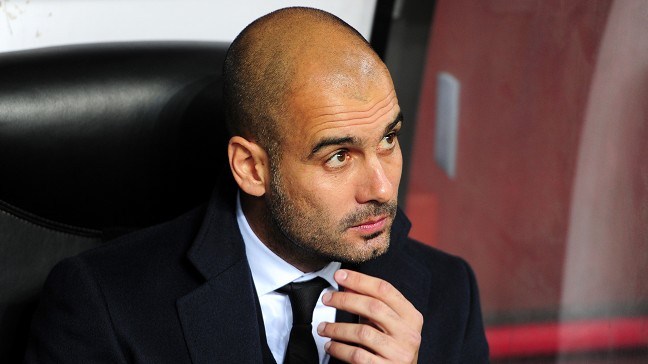The knives were out for Pep Guardiola well before the announcement that he was swapping Bavaria for Manchester. Bayern Munich’s failure to land the Champions League during his three years in charge was a regular stick with which his reputation was beaten; FC Hollywood wasn’t amused by three semi-final exits.
This, after all, his detractors contended was a squad which your grandmother could manage to the Bundesliga. He was expected to sprinkle magic dust to bring bigger prizes to the Allianz Arena. It didn’t happen and not even a domestic treble appeased them.
And in fairness, it disappointed Guardiola; “I’m sorry for the fans and especially for the players.” His exacting standards demand every trophy but pragmatically accepts there can be only one winner. While it may not have kept fans happy, the players appreciated him.
The erudite Thomas Mueller defended the Spaniard, observing that it was “crude and inconsiderate” to lay the blame solely at the former coach’s door. The team had developed during his reign and were better footballers for it which is a coded way of saying that Guardiola was a player’s coach, popular with those who delivered for him.
Carlo Ancelotti was swiftly signed as Guardiola’s replacement with a simple brief: conquer Europe. The Bavarians dominance at home continued during the early days of the Italian’s reign. Four matches without conceding across three competitions before Rostov were crushed 5 – 0 in the Allianz Arena.
Indeed, Ingolstadt were the only German team to score against Bayern before the end of September but Atletico Madrid were the first European team to do so. Crucially, it was the only goal of the game in the Vincent Calderon when the two sides met in the Champions League.
The first cracks appearing in the sheen of invincibility built up in this decade? Certainly their legs were wobbling as Eintracht Frankfurt and Cologne held them but, it seemed, business as usual with five consecutive wins across all competitions.
It proved to be a false dawn. Dortmund beat them and so did Rostov in a seismic win in the Champions League. The 2 – 3 defeat condemned Bayern to second in the group but it proved a blessing in disguise as they were drawn against Arsenal, a team they have knocked out of the competition twice in the past three years.
The final match before the winter break saw them beat RB Leipzig 3 – 0 and Bayern were crowned winter champions, three points ahead of their upstart rivals. It’s hard to know which is least popular: Bayern’s continual first-place finish or Leipzig’s rise.
The Red Bull financed club are by far and away, Germany’s most hated club. Envy and the manufactured nature of their existence unites supporters of other clubs in detesting them. However, outsiders view this change in the footballing landscape as welcome.
Anything which challenges Bayern’s hegemony is deemed positive for the domestic football scene. Hoffenheim remain the only unbeaten side in the Bundesliga but 10 draws have undermined their attempts to rise into the Champions League places.
There is still a long way to go in the season but with sixth-placed Dortmund the highest ranked of all the ‘traditional’ powerhouses, is the Bundesliga landscape changing?
And what does that say of Ancelotti’s Bayern?
The victory over Leipzig was forged on the pressing game Ancelotti learned under Arrigo Sacchi at Milan. It’s nothing unusual in Germany to see success born from the basics of the wonderful team which dominated Europe. Jurgen Klopp remains a keen advocate of the style and does Leipzig sporting director Ralf Rangnick.
But Ancelotti took his experience at most of Europe’s leading clubs and convinced the players to execute the plan perfectly. Even before Forsberg’s red card, Bayern had 63% possession and were overwhelming their opponents.
It typified the calm Italian’s approach. Methodical, well-organised and hidden beneath a veneer of laissez-faire management. His is a style which treats the players as adults and expects them to behave as such. But he is in command, make no mistake about that.
And he hones them to perform. Bayern don’t use the tactic week in, week out; it’s inconceivable anyone can use pressing for 90 minutes every game and not expect horrendous injury problems. His is a fluid approach based around a core philosophy and tweaked to ensure that the need to win is countered against the needs of the player over the course of the season.
It’s why he engenders loyalty from squads, even in the most vituperative and shallow of football clubs.
Ancelotti’s biggest test this season was to transform the style of play from Guardiola’s way to his own. Many mimic the Spaniard but few are anywhere near as successful. The Italian’s CV is as, if not more, impressive than Guardiola’s but in keeping with his character, is unassuming and mostly under-appreciated. But it underlines that he doesn’t need to copy his predecessor.
At a club used to success, this campaign has the qualities of a duck. On the surface, it is serene, calm and business as usual. The hard work is away from the public eye, beneath the surface, paddling hard to maintain direction.
The winter break may prove to be Ancelotti’s biggest ally. Bayern don’t play again until 20th January with time to work on the wrinkles which surfaced in the first four months of the season. Time spent on the training ground will prove beneficial on the pitch.
It will come as no surprise to see Bayern stretch their lead at the top of the Bundesliga as the winter snows thaw while Arsenal are expected to be beaten with little problem. Carletto, as Ancelotti was known as a player, has his way and the squad he inherited are learning that. Bayern will find it business as usual when they do.

